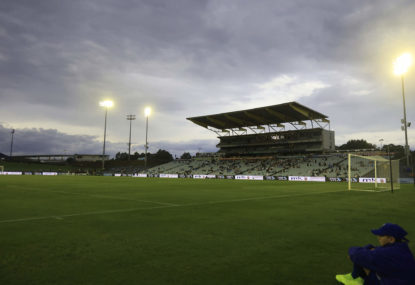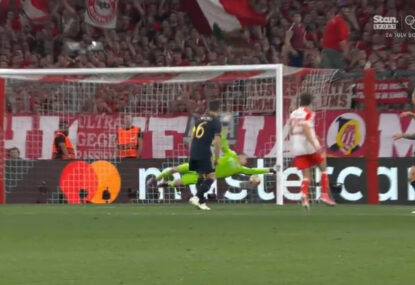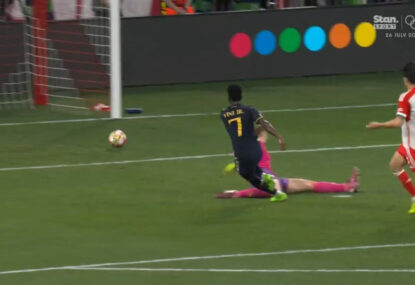The Bible says: ”the race is not always to the swift nor the battle to the strong”. To which Damon Runyon, one of the first great American sports writers added: “Maybe not, but that’s the way to bet!”
Studying the form is essential to making an informed decision on a team’s prospects for a forthcoming championship.
So if, as some here suggest, an Australian bid to host the 2022 World Cup should go hand in glove with a serious attempt to win it, here are a few observations, based on past performances, on what it takes to be World Champions.
10 Have a deadly goalscorer
In tenth place because it is not the most crucial factor, although it helps.
Only in four WC tournaments has the outright top goal scorer come from the winning team – in 1930, 1978, !982 and 2002. In 1962 and 2010 a player from the champions tied at the top with other players. But four years ago, Italy’s joint leading scorer, with an almighty two, was central defender Materazzi, better known for having an imprint of Zinnedine Zidane’s forehead in his chest.
9 Home advantage helps, a little
The host nation has won on six out of 19 occasions.
Uruguay, Italy, West Germany and Argentina each won both at home and away. France got to the final in Germany and England is the only victorious host nation never to reach another final. Hosts are still twice as likely to lose as to win.
8 Playing on your own continent helps a lot…if you’re European or South American
On only three occasions has a team won outside its own continent.. European teams never win in America; only Brazil has won in Europe and that was more than 50 years ago. Nobody from Africa or Asia has ever won, period.
Could Australia go one better?
7 Be one of the Big Four countries
Brazil, Argentina, Italy and (West) Germany have won 14 of the 19 tournaments between them. They have also been runners up another ten times between them. If they had to insure themselves against winning, they’d be paying top premiums. Nothing you can do about that.
6 You must have a viable league of your own
Despite jet travel, global communications and the concomitant colonisation of the world imagination by the major European leagues you will still need about half of your squad to be home-based players.
West Germany in 1974 was the first country to win the World Cup without a completely home based squad, but 21 out of 22 played in the Bundesliga with the sole exception, Gunter Netzer of Real Madrid, only making one brief appearance as a substitute early on..
Since then the number of foreign based players on champion sides has steadily increased. France in 1998 had nine of its 22 players and two of its starting 11 in the final playing in France.
Nevertheless, the vast majority of its players learned their trade in France before being poached by the bigger clubs of Italy and England. Ditto for Brazil. Your grass roots need to be strong.
5 Dee-fence Dee-fence
A great goalkeeper is a better guarantee of success than a great striker. Especially nowadays. Spain have just become champions with the lowest goal tally in history, a mere eight. But then they only conceded two and that was one more than Italy conceded four years ago.
In the last 30 years no winning team has conceded more than five goals in their seven games. Brazil leaked more than a goal a game in 1970, but then their attack was truly exceptional.
So unless you have people called Pele, Jairzhino, Rivelino, Tostao and Gerson in your team, keep it tight at the back.
4 There’s no substitute for class players.
You had better have at least two or three players as good as any in the world in your team. Casillas, Villa, Iniesta and Xavi would grace any team in the world.
As would Cannavaro, Buffon or Pirlo of Italy four years ago. Maybe Argentina in 1986 had a few players who would struggle to get into some national sides but Valdano and Burruchaga were top class, and Maradona was in a class of his own. England’s Banks, Moore and Charlton were all-time greats as well.
You want to win the world cup? You’ll need more than Harry Kewell and Tim Cahill.
3 Top players at the top clubs
Italy had an entirely home-based squad when they won four years ago. Spain had 20 of their 23 based at home. On the face of it, a trend that favours a strong home league but really what this shows is that your best players should be playing in the top domestic European leagues, such as those of Italy, Spain or England.
In total, since Kempes in 1978, winning teams tend to have players playing in Italy, Spain, England, France or Germany. And for the top clubs as well.
Squad players at Fulham and Everton are not in the same league.
2 You MUST have a home grown manager
The most identical common trait to every single world cup winner is that the manager was of that country. In fact, of the 19 runners up, only two managers (Englishman George Raynor with Sweden in 1958 and Austrian Ernst Happel with Holland in 1978) were foreigners.
You want to have a prayer? Make sure your manager is called Bruce, drinks Fosters, drives a Holden and knows how to barbie a shrimp.
1 Ignore all of the above. History is bunk
Laws are made to be broken, especially laws of observation. Until this year, at least one of the finalists was ALWAYS from one of the Big Four countries. Holland and Spain broke that mould. There’s a first time for everything. Even the most unlikely things.




































































































